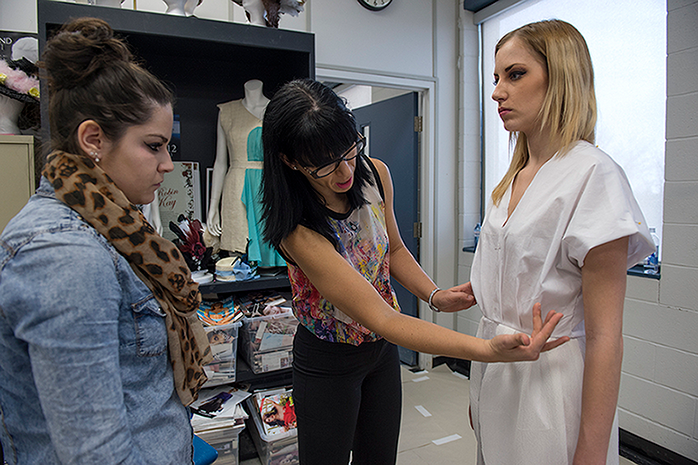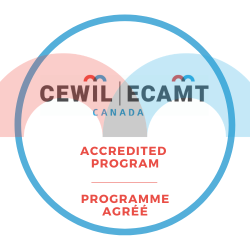Fashion Design (Co-op)

*Domestic applicants include Canadian citizens, permanent residents, protected persons and Convention refugees.
Fashion Design is a three-year co-operative Ontario College Advanced Diploma program providing professional career-directed training in the development, production management and marketing of apparel design. Through classroom theory, lecture, lab work, field trips and work term experience, skills are applied. Networking with industry professionals promotes future employment opportunities. Emphasis is placed on design analysis, apparel manufacturing and technology, and design communications and marketing.
You’ll develop skills in creative design, visual communication, business marketing and apparel production technologies. You’ll also learn practical skills like fashion illustration, computer aided design, pattern-making and draping and garment construction. The third year of study culminates with a capstone project, where students concept, produce and present a final collection.
Apply your skills throughout the program in a combination of lab work, field trips, and working semester experiences, as well as in a variety of research opportunities. Our faculty are committed to research opportunities through industry and community partnerships that move the industry forward. With these experiences, you’ll graduate with a professional portfolio and the skills to work in a variety of jobs in the fashion and apparel industry.
Skills such as fashion illustration, computer-aided design, pattern-making and draping, and apparel construction techniques are taught, and supported by studies of textile technology, historical research, manufacturing processes and applied computerized technology in the fashion industry. The program fosters creative and independent problem solving in students, preparing them for a future in the various sectors of the rapidly changing fashion and apparel industry.
The Fashion Design program offers a cooperative education component, which provides students the opportunity to gain invaluable first-hand workplace experience in their chosen field. Here are some co-op jobs that have kick-started the careers of some Fashion Design students before even graduating!
Assistant Designer
Aide in the creation of an apparel line through illustration, cutting, stitching and pattern tracing.
Production Assistant
Assist in the quality control and efficient production of products.
Sewer/Tailor
Custom garments according to client needs. Repurpose something vintage, or simply alter a piece for continued wear.
For more information regarding co-op, please check out our co-op site or contact the Co-op Office at coop@fanshawec.ca to connect with a consultant.
With a passion for fashion and an eye for design, graduates of Fanshawe’s Fashion Design program can make that quote come alive in a rewarding career working in positions of:
● development production
● production in apparel manufacturing
● designers
● assistant designers
● technical designers
● computerized fashion illustrators
● pattern makers
● graders
● quality controller technicians
● CAD aided design technologists
● independent designers or consultants
Did you know Fanshawe consistently ranks high in graduation employment rates among large colleges in Ontario?
Here are some examples of career opportunities for graduates of Fanshawe’s Fashion Design program:
Technical Designer
Set up, maintain and update style summaries, create technical sketches for design, track and relate all changes and modifications from fit meetings to suppliers.
Fashion Designer
Manufacture, produce, market and sell streetwear.
Seamstress – Bridal and Special Occasion Wear
Complete flawless alterations including hems, bustles and custom requests.
| Year | Fall | Winter | Summer |
|---|---|---|---|
| Year 1 | Level 1 | Level 2 | *Co-op (see below) |
| Year 2 | Level 3 | Level 4 | *Co-op (see below) |
| Year 3 | Level 5 | Level 6 | *Co-op (see below) |
* Two co-op terms in the summer (May to August) after Year 1, 2 or 3.


This program is accredited by Co-operative Education and Work Integrated Learning Canada. This accreditation represents the highest standard of achievement for co-operative education programs in Canada, and recognizes Fanshawe's commitment to excellence.
The graduate has reliably demonstrated the ability to
Karen Harley
| Test | Score |
|---|---|
| TOEFL iBT | Overall score of 4.5 with no score less than 4 in any band |
| IELTS Academic | Overall score of 6.0 with no score less than 5.5 in any of the four bands |
| CAEL | Overall score of 60 with no score less than 50 in any of the four bands. score of 80 in listening |
| PTE Academic | Minimum score of 53 with no score less than 45 in any of the four bands |
| Cambridge English | Overall score of 169 with no language skill less than 162 |
| ESL4/GAP5 | Minimum grade of 80% in Level 8, 75% in Level 9, or 70% in Level 10 |
| Duolingo | Overall score of 105, with no score lower than 95 |
| LANGUAGECERT | Overall score of 65 with no score less than 60 in any of the four skills |
| Level 1 | ||||
| Take all of the following Mandatory Courses: | ||||
| WRIT-1036 | Reason & Writing 1-Art & Design | 3 | ||
| This course introduces students to essential principles of reading, writing, and reasoning at the postsecondary level. Students will identify, summarize, analyze, and evaluate multiple short readings and write persuasive response essays to develop their vocabulary, comprehension, grammar, and critical thinking. | ||||
| DRAF-1057 | Pattern Making 1 | 3 | ||
| Students will be introduced to the fundamental skills of patternmaking for apparel. Drafting basic blocks for pants and skirts will be followed by the main principles of flat patterning; dart manipulation, contouring and adding fullness. Concepts of ease, silhouette and body dimensions will be introduced to provide a solid base for further learning in flat pattern development. Students will work to develop blocks to standard sizes, interpret designs into flat patterns and create cohesive pattern sets that function as a complete garment through a variety of in-class exercises/drafts and practical assignments. Exercises and assignments will explore pant and skirt silhouettes, pockets, closures, waistband and finishes specific to skirt/pant garments. | ||||
| ARTS-1024 | Fashion Drawing & Theory | 2 | ||
| This course introduces the student to the fundamental skills of fashion drawing for the fashion designer. These include the use of line, space shape, texture and colour. Further studies include the application of proportions, balance and movement to the fashion figure. Students will be introduced to a variety of medium to encourage their drawing skills. The students will become acquainted with the use of a designer croquis as a fashion drawing tool. Students will complete final fashion composition presented and mounted in a professional manner. | ||||
| DESG-1062 | Sample Room Production 1 | 3 | ||
| In this course student will build basic sewing and construction techniques used in the fashion industry. During the semester they will gain practical experience using industry standard industrial machines and equipment. Students develop familiarity with assembly methods through the construction of samples and sample garments, culminating with work on a final project. | ||||
| FASH-1003 | Design Studio 1 | 2 | ||
| This studio-based course introduces students to the foundational principles of fashion design through the lens of creativity, sustainability, and personal expression. Using "Creativity in Fashion Design: An Inspiration Workbook " as a guide, students explore the design process through hands-on exercises, reflective sketchbook work, and collaborative critiques. Emphasis is placed on upcycling, inclusive inspiration sourcing, and developing an authentic visual voice. Digital tools and free AI platforms support idea generation and portfolio development. | ||||
| FASH-1005 | Fashion Industry Analysis | 2 | ||
| This course provides the students with an introduction to the principles in which the fashion world revolves; and the role of economic, sociological and psychological elements in the fashion cycle. The course includes an overview of the fashion industry focusing on design, product development, manufacturing, marketing and retailing. Students will research contemporary fashion designers and examine their roles and influences on current fashion trends. | ||||
[1] Total program costs are approximate and subject to change. They do not include additional fees such as the health and dental plan, bus pass, or general expenses. Learn more about ancillary and additional fees.